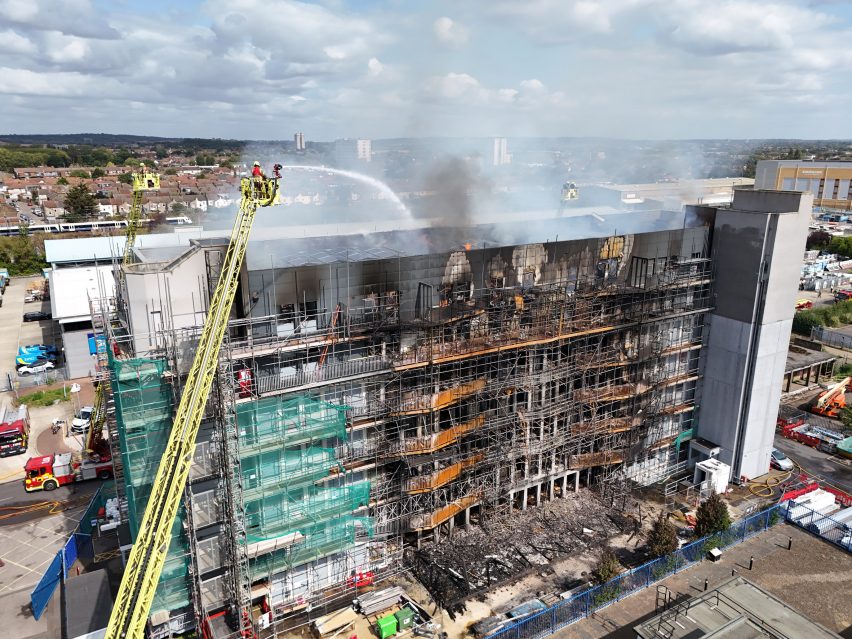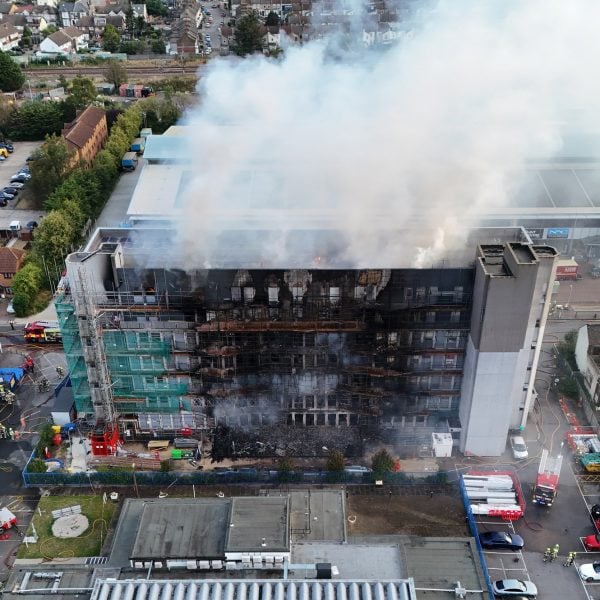A major fire in a high-rise building in east London over the weekend has exposed the ongoing issue of flammable cladding in the UK, the Fire Brigades Union has said.
The fire, which started in a mixed-use commercial and residential tower block in the early hours of Monday morning, led to more than 80 people being evacuated and two being taken to hospital but did not result in any fatalities.
Images from the scene appear to indicate that the fire spread the full height of the building, which news channel ITV reported was undergoing work to remove “non-compliant cladding”.
FBU calls for “urgent and swift” investigation
In a statement, the Fire Brigades Union (FBU), which represents firefighters, said the building had been the subject of a fire-safety enforcement notice in 2023 and called for an investigation.
“Once again, a fire has erupted in a residential building wrapped in flammable cladding,” said FBU general secretary Matt Wrack.
“There needs to be an urgent and swift investigation of how this has been allowed to happen,” he added. “Hundreds of thousands of people continue to live in buildings like it, with various failings in fire safety. This is a national scandal.”
Forty fire engines and around 225 firefighters were called to attend the fire on Freshwater Road in Dagenham at 02.44am on Monday morning, with the fire, which the London Fire Brigade (LFB) declared a major accident, under control at 11.13am.
“We will now begin a full investigation into the fire and its cause,” said London fire commissioner Andy Roe.
“This was a very dynamic and challenging incident, and we know there will undoubtedly be concerns around the fire safety issues present within the building and this will form part of our report.”
Commissioner Roe added: “Control Officers took 16 calls to the fire, including successfully giving vital fire survival guidance to a number of people. They are also to be commended for their calm professionalism”.
Photo from earlier in incident https://t.co/y3z7P1LeIQ pic.twitter.com/w73Mlntpib
— London Fire Brigade (@LondonFire) August 26, 2024
The London Fire Brigade declared the fire a major incident
Roe also said that the building “has a number of fire safety issues known to London Fire Brigade.”
Wrack argued that the fire was another example of “significant building safety failings” following the Grenfell Tower fire in June 2017 that killed 72 people.
“For decades, the FBU has warned of the risks of deregulation in the building sector,” Wrack said.

“Politicians have put the interests of big business above human life,” he added. “As we saw at Grenfell Tower, this can have horrific and tragic consequences.”
Around 4,600 buildings across the UK have been identified as having unsafe cladding since the Grenfell Tower fire seven years ago.
According to the most recent official data, remediation work has either started or completed on only 50 per cent of these.
Fire was “entirely avoidable”
The FBU called the fire “entirely avoidable” and said warnings about the building had been ignored.
“We have highlighted significant building safety failings before and since the Grenfell Tower fire. It was already known that the Dagenham tower block was dangerous,” Wrack said.
“Time and time again, these warnings have been ignored by public authorities and by central government,” he added. “This must change immediately.”
The Dagenham fire comes just a week before the final report on the Grenfell inquiry is set to be published and has once again drawn attention to the role of flammable cladding.
The UK government was informed that the polyethylene-cored aluminium composite material cladding installed on Grenfell Tower should “never ever be used” on high-rise buildings 15 years before the block was destroyed in the fire.
Planning documents indicate that the cladding being removed from the Dagenham building was high-pressure laminate, which has been implicated in several previous fires.
More than 900 survivors and others affected by the Grenfell Tower fire reached a civil settlement in April of last year.
The photography is by Darren Sidey.
